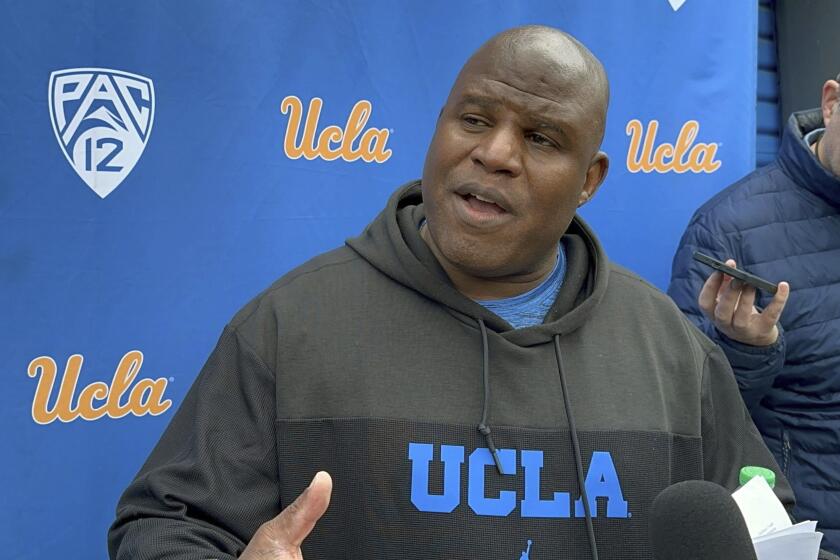Sunday Drivers
As a motorsports fan, I logged some major couch time on the Sunday before Memorial Day: first, the Monaco Grand Prix, then the Indy 500, and finally the less-than-effervescent Coca-Cola 600, a NASCAR event under
The lights at Lowe’s Motor Speedway in Charlotte. Each of these events has its pageants and paeans: At the Monaco race, the Grimaldis use parades and ceremonial greetings of the royal family to prop up the image of the principality as a site of ancient nobility instead of what it really is, a dodgy and historically suspect high-rise refugee camp for les riches.
The pre-race activities of the Indy 500 and Coca-Cola 600 were all about the troops. In addition to the usual F-22 flyovers and color guard presentations, Lowe’s track director “Humpy” Wheeler arranged for the U.S. Army to “secure” the front stretch of the racetrack, with troops in full battle rattle, armored personnel carriers, helicopters and a Howitzer. Eight Nextel Cup race teams surrendered $8 million in advertising when they repainted their cars with military-themed graphics as part of an “American Heroes” program. In the money-obsessed world of NASCAR, this was no empty gesture.
Perhaps I was the only one made uncomfortable by this welding of sport and militarism, but it seemed at times I might have been watching the German Grand Prix of 1938. It also seemed to me more than a touch neurotic. It’s possible that, given the fool’s errand on which we have sent our military in Iraq, we feel we can’t say thank you enough, nor can we bring ourselves to say the obvious and more appropriate thing: We’re sorry.
And yet, for all the troop-honoring and American hero worship, the U.S. public is astonishingly illiterate about Memorial Day, which is officially observed on the last Monday in May. Not once on Monday did I see an American flag flown at half-mast, as it should be from dawn until noon. (By the way and for the benefit of all you super-patriots out there, you should not fly the flag at night unless it is lighted; and it is generally considered crass to use the flag as part of your company’s advertising. For other fundamentals of flag etiquette, consult your nearest Boy Scout Handbook.)
Memorial Day is not an occasion to celebrate the members of the armed forces, per se--we actually have an Armed Forces Day on May 19, but it passes without much in the way of Toyota “Madness” blowouts or super mattress sales. Memorial Day, once called Decoration Day, began as what it sounds like: a solemn occasion to remember those who have died in our nation’s service. It has become--thanks to the Uniform Holidays Act of 1971, which established the three-day weekend--the day we drive home from the beach.
Americans are not very good at solemnities. I just finished Craig Harline’s recent book “Sunday: A History of the First Day from Babylonia to the Super Bowl,” a book as comprehensive as its post-colonic flourish suggests. Sunday has a tale to tell. It was, first of all, a politically attractive day of reverence that was fixed on the calendar on the Roman Sun Day, the first day of the week, as a compromise between pagan and Christian elements. To the Jews, of course, Saturday was the holy Sabbath. Christians gravitated to Sunday in part to separate themselves, doctrinally and otherwise, from the Jews.
Next came the question of how and to what extent the day be kept holy. The early Christian church (Council of Rouen in 650) established Sunday as a Sabbath-like day of rest, and then codified a long list of impermissible activities. Anyone who has toured churches in Europe has likely seen images of the “Sunday Christ,” around which implements of work--scissors, scythe, shears--are posed to pierce the flesh of the Messiah, their use on Sunday a literal affront to the body of Christ. Many pleasures were forbidden too, including drinking, dancing and their inevitable sum, sex.
The United States wrestled with Sabbatarianism through the latter half of the 19th century and well into the 20th century, but by the 1950s, the Puritan Sunday had given way to enormous pressures for leisure, entertainment, commerce and sports. Particularly sports. Harline begins and ends his book with Super Bowl Sunday, an event that in its rituals, prayer breakfasts, helmeted heads bowed during the invocation, represents the sacralization of the secular. NASCAR too has its showy effusions of pre-race piety that innoculate it from charges of sacrilege. Thank God and Goodyear.
According to a 2006 Pew Forum survey, 60% of white evangelicals--an audience not unknown to NASCAR--believe the Bible should have more influence on U.S. laws than the will of the people. But are they willing to live by that? If they check their Deuteronomy, they’ll see racing on Sunday is not allowed. The same goes for football, baseball and golf.
It is a curious corner of the American character that allows people who neglect the simplest conventions of patriotism to wrap themselves in the biggest flag imaginable, that permits people who couldn’t name the Ten Commandments at gunpoint to swear they are the divine law of the land.
We’re a deeply patriotic and religious people. Just don’t bother us with the details.
More to Read
Go beyond the scoreboard
Get the latest on L.A.'s teams in the daily Sports Report newsletter.
You may occasionally receive promotional content from the Los Angeles Times.










